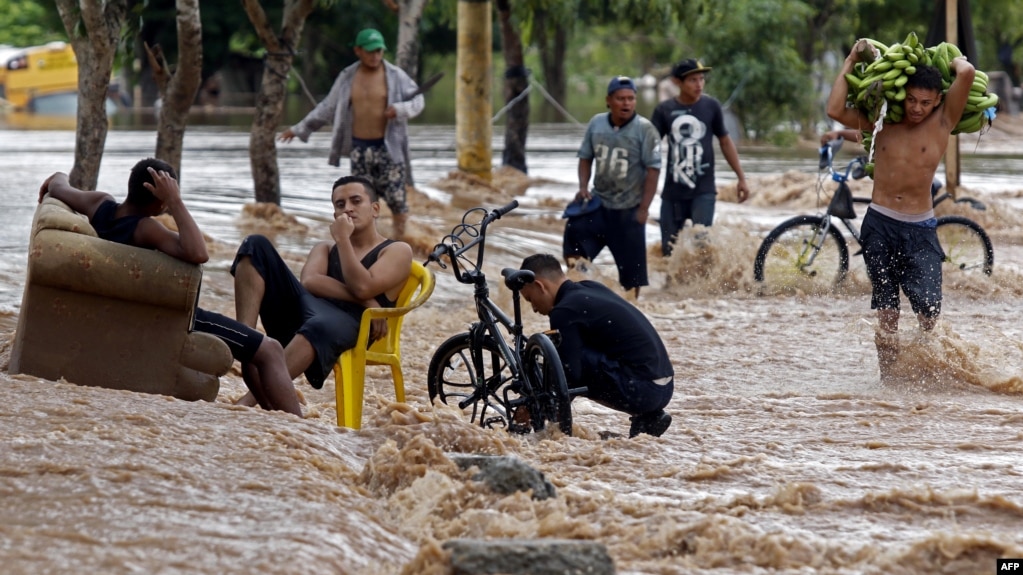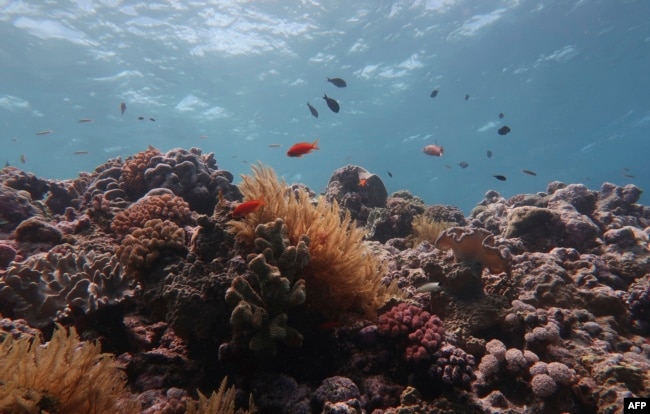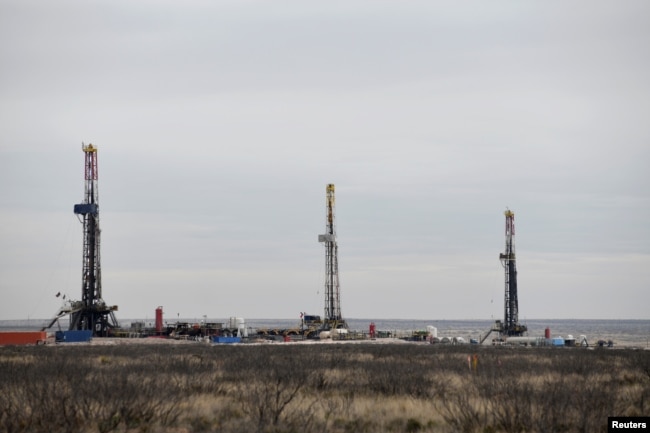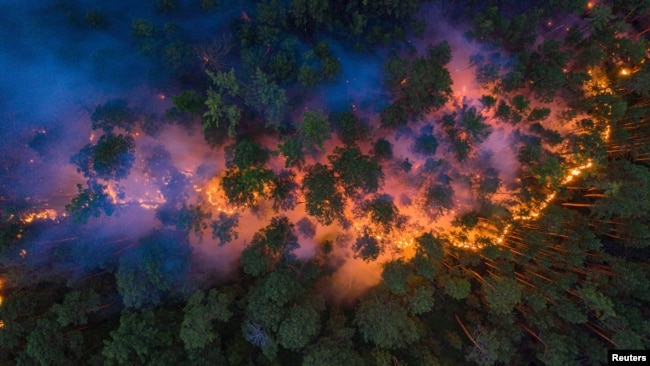
A yougster carries bananas as he wades near men sitting at a flooded street in El Progreso, department of Yoro, Honduras on November 18, 2020, after the passage of Hurricane Iota, now downgraded to Tropical Storm.
2020 has been an extreme year for hurricanes, wildfires and heat waves around the world. New reports from United Nations agencies list this year’s record-breaking weather and the burning of fossil fuels as causes of continued global warming.
U.N. Secretary-General Antonio Guterres recently urged world leaders to make 2021 the year that humanity ends what he calls its “war on nature.” He asked them to commit to a future free of planet-warming carbon pollution.
The secretary-general’s comments come as the U.N. prepares for a Dec. 12 online climate meeting in France on the 5th anniversary of the 2015 Paris climate agreement. A main goal of that agreement is to keep increases in the Earth’s temperature during this century to between 1.5 and 2 degrees Celsius.
In a speech given at New York’s Columbia University, Guterres said, “The state of the planet is broken. Humanity is waging war on nature. This is suicidal.”
“Apocalyptic fires and floods, cyclones and hurricanes are increasingly the new normal,” he added.

An undated handout photo received from the ARC Centre of Excellence Coral Reef Studies on October 14, 2020 shows a damaged part of the Great Barrier Reef - the vast World Heritage-listed reef off Australia's northeastern coast.
In a report, the World Meteorological Organization (WMO) said this year is set to end about 1.2 degrees Celsius warmer than the last half of the 1800s. Scientists use that time period as a starting point for warming caused by heat-trapping gases from the burning of coal, oil and natural gas. Most trapped heat goes into the world’s seas. Ocean temperatures are now at record levels. It also means 2020 will be one of the three hottest years on record.
Climate Action Tracker scientists observe carbon pollution and the countries that promise to reduce it. A new study from the scientists says public promises to reduce emissions would limit warming to about 2.6 degrees Celsius. Warming could possibly be as low as 2.1 degrees Celsius.
Guterres saw hope that more than 100 countries have promised that by 2050 they will not be adding more heat-trapping gases to the atmosphere than trees and technology can remove. China and U.S. President-elect Joe Biden have promised net zero carbon emissions.
But Guterres said the two U.N. reports “spell out how close we are to climate catastrophe.”

FILE - Drilling rigs operate in the Permian Basin oil and natural gas production area in Lea County, New Mexico, U.S., February 10, 2019. (REUTERS/Nick Oxford)
Nations should stop providing financial support for fossil fuels, he said. And countries need to fulfill their Paris promise to spend $100 billion yearly to help poorer countries develop cleaner energy.
One of the new reports found countries would need to cut production of oil, coal and natural gas by 6 percent each year by 2030 to keep global temperatures from rising more than 1.5 degrees Celsius. But a review of eight major fossil-fuel producing nations showed they plan to increase production by 2 percent yearly. That means twice the amount of carbon-based fuel would come onto the market than would be able to keep the Paris goal within reach.
Governments in the Group of 20 major and developing economies have so far committed more money to support fossil fuel production than to aid the use of renewable energy, the report found.
Ivetta Gerasimchuk of the International Institute for Sustainable Development said investing in oil, coal and gas no longer makes economic sense because renewable energy is becoming less costly than fossil fuels. But, she said, “We see that instead of governments letting these fossil fuel projects die they resurrect them from the dead.”
The WMO’s report found global warming is worsening in all seven important climate areas. But it said the problem is also increasing human suffering in an already bad year.
“In 2020, over 50 million people have been doubly hit: by climate-related disasters (floods, droughts and storms) and the COVID-19 pandemic,” the report said.

FILE - An aerial view shows a forest fire in Krasnoyarsk Region, in Siberia, Russia July 17, 2020. (Julia Petrenko/Greenpeace/Handout via Reuters)
Here are some of the extreme weather events this year the report noted:
A record 30 Atlantic named tropical storms and hurricanes.
Death Valley, California, hit 54.4 degrees Celsius, the hottest the world has seen in 80 years.
Record wildfires struck California and Colorado in the western United States, following a major fire season and record heat in Australia.
The Arctic had record wildfires and a prolonged heat wave culminating in a mark of 38 degrees Celsius in Siberia in June.
Record low Arctic sea ice was reported for April and August and the yearly minimum, in September, was the second lowest on record.
And more than 2,000 people died in record summer rains and flooding in Pakistan and surrounding nations.
I’m Jonathan Evans.
Seth Borenstein and Frank Jordans reported on this story for the Associated Press. Jonathan Evans adapted this story for Learning English. Bryan Lynn was the editor.
_______________________________________________________________
Words in This Story
apocalyptic – adj. of, relating to, or involving terrible violence and destruction; of or relating to the end of the world
catastrophe – n. a terrible disaster
commit – v. to say that someone or something will definitely do something; to make someone or something obligated to do something
emissions – n. the act of producing or sending out something such as energy or gas from a source; something sent out or given off
fossil fuels – n. fuels such as coal, oil, or natural gas formed in the earth from dead plants or animals
prolonged – adj. lasting longer than usual or expected : continuing for a long time
resurrect – v. to raise from the dead
Comprehension Quiz
What are the causes of continued global warming?